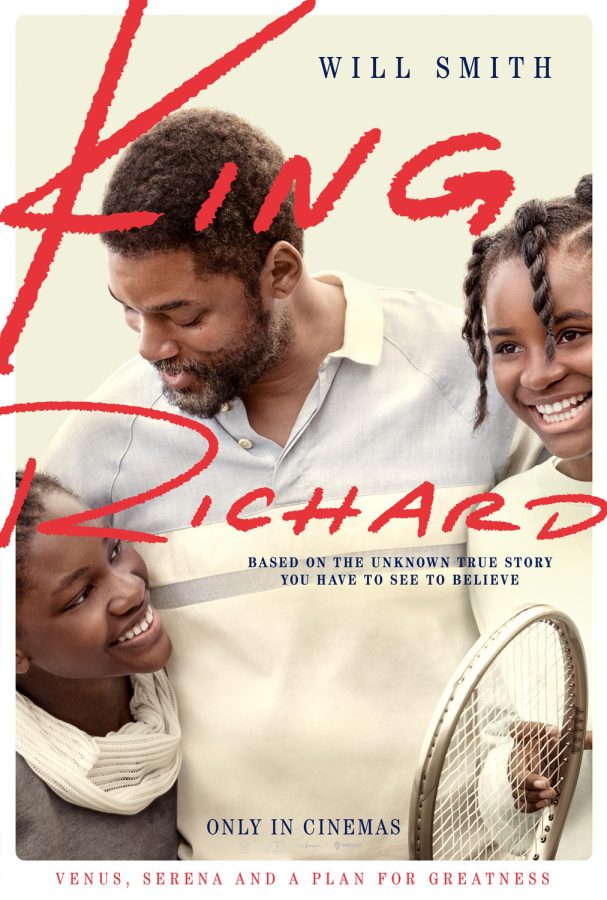“King Richard” review: Richard the hero or Richard the Third?
March 18, 2022
Will Smith offers a stirring performance as the deeply committed, complex patriarch of the globally recognizable Williams sisters in the sport biographical picture “King Richard.”
The film follows Richard, father of future professional tennis players Venus and Serena Williams, as he pushes them from an unassuming Black upbringing in Compton to national stardom, as the daughters dominate in the typically wealthy, white world of tennis. While the film sticks with the tried and true structure of sports dramas before it, what sets it apart is the characterization of the film’s titular character. Throughout the film, his arc offers growth from hotheadedness to humility.
At his core, Richard wants nothing more than the success of his daughters. His unconditional devotion and belief in his children provides him with an endearing complexity. As a character study, the film goes from good to great as Richard eventually concedes and listens to his wife and children. At first overbearing and somewhat rigid, he develops into a caring, supportive father, not to mention successful in his endeavors.
This would not have been possible without Smith’s show-stopping performance. Many have known the actor from his charismatic, comedic appearances in “The Fresh Prince of Bel-Air” and in several action films, so his return to the craft of film acting is nothing short of compelling.
Initially upon watching, I had very little respect for Richard as I felt like he was an inadequate parent, forcing his expectations upon his children and at some points outright favoring Venus. Just through Smith’s ability to completely change my opinions on Richard by the end is what made the film so admirable to me.
This is truly some of the best work I have seen from Smith since “Ali” or “The Pursuit of Happyness.” To me, his performance was wholly deserving of his recent wins at the Golden Globes and the Screen Actors Guild Awards. Will he also win the Academy Award over the likes of Javier Bardem, Benedict Cumberbatch, Andrew Garfield, and Denzel Washington? With a competitive stage like this, I think it is in the court for any of the aforementioned names.
While Smith’s performance shines bright, the rest of the company’s performances are far from diminished. Saniyya Sidney and Demi Singleton serve as wonderful interpretations of the Williams sisters, as their striking physical similarities to the real-life sisters often made me forget they were retellings of true, larger than life athletic figures.
Aunjanue Ellis soars in her contrast to Richard as the matriarch of the Williams. Outspoken, she never allows Richard to silence her thoughts or opinions. By having two fearless Black parents, the film reaches audiences of Black backgrounds – something Hollywood has not usually excelled at historically.
The rest of the supporting cast delivers as well, living up to their acclaimed names. Jon Bernthal, Tony Goldwyn, Dylan McDermott, and Liev Schreiber to name a few elevate this film from a sports biopic to a story at its core about a parents’ unmatched love for their children and how a village supported them.
From a technical aspect, the film’s visual style rings closer to the cinematography of contemporary dramas, which is a nice juxtaposition from traditional sports films. The fast-paced editing in particular keeps the tennis matches exciting. However, the soundtrack is what truly transcends this film apart for me. Featuring musical titans such as Beyonce, Nina Simone, and Dolly Parton, the film is hoisted off the screen and into an introspective experience for myself as the audience, while also reflecting on the contradictions between selflessness and selfishness.
Admittedly, I have never been a huge fan of sports dramas. While this exceeded my expectations, I do wish there was more of a focus on Venus and Serena’s perspectives, as opposed to the main narrative being that of their parents. Regardless, I believe the film is tender while remaining strong-headed. Director Reinaldo Marcus Green explores the depths of parental love, success, and failure, as he transcends Richard from an overbearing father to a relentless hero through subtlety, humility, and acceptance.
“King Richard” is now showing in theaters.









Daniel Sevilla pal • Nov 20, 2024 at 11:58 am
I leave it comments because something Carry out me to do it. Being I am into an isolation of very things. But I got through this legend About the WILL Smith’s role the biography of two greats Sportswomen which supported by a Great father reach the Fame. The love it’s a vehicle to done all in ours life. Sorryly may I will see the film 🎥 later than this 2024 and I know was at 22. But thanks to leave it legend for I get noticed about this four Greats persons of the world 🌎 represented by the mentioned Smith and the artist’s lot.